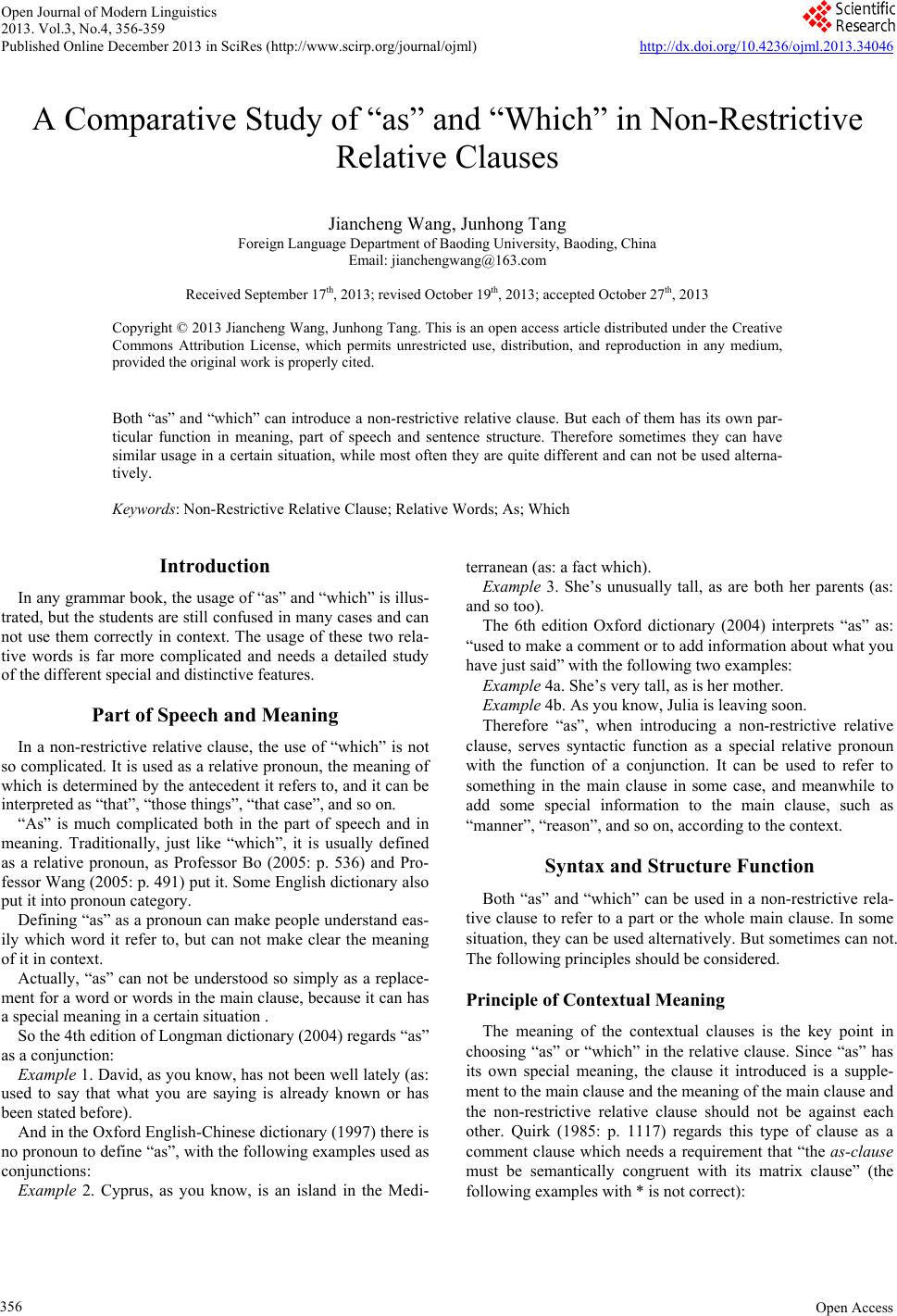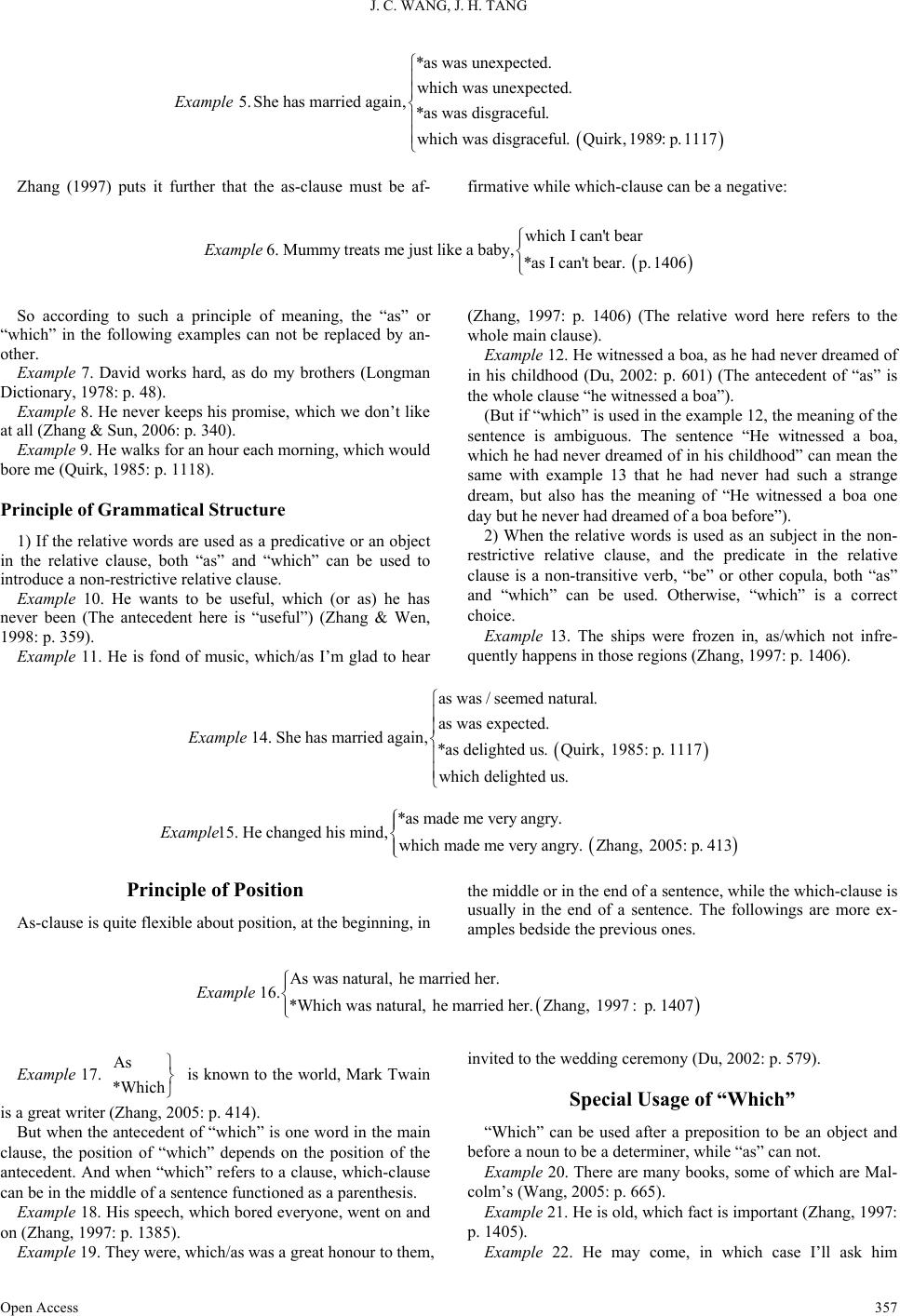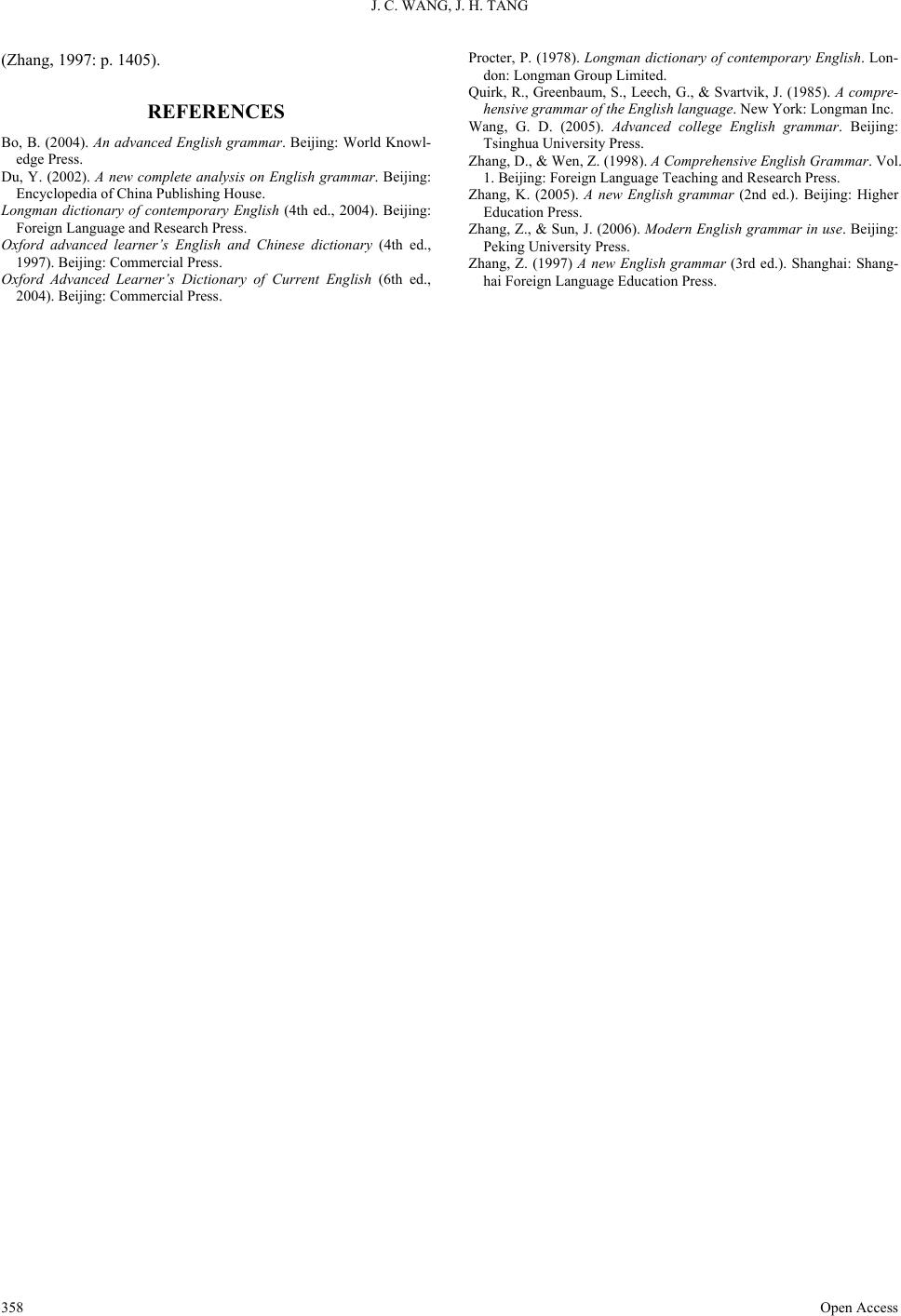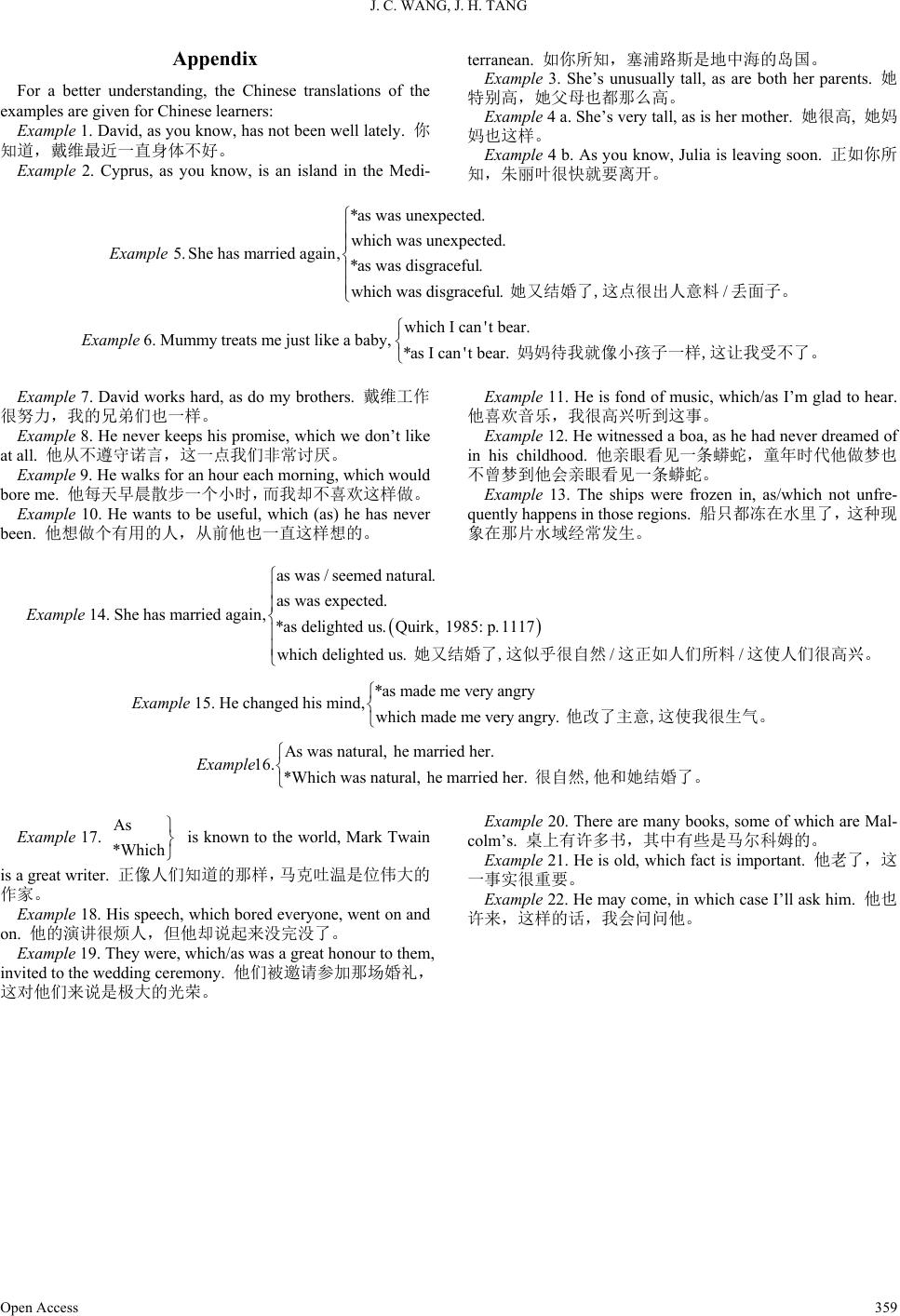Paper Menu >>
Journal Menu >>
 Open Journal of Modern Linguistics 2013. Vol.3, No.4, 356-359 Published Online December 2013 in SciRes (http://www.scirp.org/journal/ojml) http://dx.doi.org/10.4236/ojml.2013.34046 Open Access 356 A Comparative Study of “as” and “Which” in Non-Restrictive Relative Clauses Jiancheng Wang, Jun hong Tang Foreign Language Department of Baoding Unive rsity, Baoding, China Email: jianchengwang@163.com Received September 17th, 2013; revised October 19th, 2013; acc ept ed Oct obe r 27th, 2013 Copyright © 2013 Jiancheng Wang, Junhong Tang. This is an open access article distributed under the Creative Commons Attribution License, which permits unrestricted use, distribution, and reproduction in any medium, provided the original work is properly cited. Both “as” and “which” can introduce a non-restrictive relative clause. But each of them has its own par- ticular function in meaning, part of speech and sentence structure. Therefore sometimes they can have similar usage in a certain situation, while most often they are quite different and can not be used alterna- tively. Keywords: Non-Restrictive Relative Clause; Relative Words; As; Which Introduction In any grammar book, the usage of “as” and “which” is illus- trated, but the students are still confused in many cases an d can not use them correctly in context. The usage of these two rela- tive words is far more complicated and needs a detailed study of the different special and distinctive features. Part of Speech and Meaning In a non-restrictive relative clause, the use of “which” is not so complicated. It is used as a relative pronoun, the meaning of which is determined by the antecedent it refers to, and it can be interpreted as “that”, “those things”, “that case”, and so on. “As” is much complicated both in the part of speech and in meaning. Traditionally, just like “which”, it is usually defined as a relative pronoun, as Professor Bo (2005: p. 536) and Pro- fessor Wang (2005: p. 491) put it. Some English dictionary also put it into pronoun category. Defining “as” as a pronoun can make people understand eas- ily which word it refer to, but can not make clear the meaning of it in context. Actually, “as” can not be understood so simply as a replace- ment for a word or words in the main clause, because it can has a special meaning in a certain situation . So the 4th edition of Longman dictionary (2004) regards “as” as a conjunction: Example 1. David, as you know, has not been well lately (as: used to say that what you are saying is already known or has been stated before). And in the Oxford English-Chinese dictionary (1997) there is no pronoun to define “as”, with the following examples used as conjunctions: Example 2. Cyprus, as you know, is an island in the Medi- terranean (as: a fact which). Example 3. She’s unusually tall, as are both her parents (as: and so too). The 6th edition Oxford dictionary (2004) interprets “as” as: “used to make a comment or to add information about what you have just said” with the following two examples: Example 4a. She’s very tall, as is her mother. Example 4b. As you know, Julia is leaving soon. Therefore “as”, when introducing a non-restrictive relative clause, serves syntactic function as a special relative pronoun with the function of a conjunction. It can be used to refer to something in the main clause in some case, and meanwhile to add some special information to the main clause, such as “manner”, “reason”, and so on, according to the context. Syntax and Structure Function Both “as” and “which” can be used in a non-restrictive rela- tive clause to refer to a part or the whole main clause. In some situation, they can be used alternatively. But sometimes can not. The following principles should be considered. Principle of Contextual Meaning The meaning of the contextual clauses is the key point in choosing “as” or “which” in the relative clause. Since “as” has its own special meaning, the clause it introduced is a supple- ment to the main clause and the meaning of the main clause and the non-restrictive relative clause should not be against each other. Quirk (1985: p. 1117) regards this type of clause as a comment clause which needs a requirement that “the as-clause must be semantically congruent with its matrix clause” (the following examples with * is not correct):  J. C. WANG, J. H. TANG Open Access 357 *as was unexpected. which was unexpected. 5.She has married again,*as was disgraceful. which was disgraceful. Quirk,1989p.1117 Example : Zhang (1997) puts it further that the as-clause must be af-firmative while which-clause can be a negative: whichIcan't bear 6. Mummy treats me just like a baby,*asIcan't bear. p.1406 Example So according to such a principle of meaning, the “as” or “which” in the following examples can not be replaced by an- other. Example 7. David works hard, as do my brothers (Longman Dictionary, 1978: p. 48). Example 8. He never keeps his promise, which we don’t like at all (Zhang & Sun, 2006: p. 340). Example 9. He walks for an hour each morning, which would bore me (Quirk, 1985: p. 1118). Principle of Grammatical Structure 1) If the relative words are used as a predicative or an object in the relative clause, both “as” and “which” can be used to introduce a non-restrictive relative clause. Example 10. He wants to be useful, which (or as) he has never been (The antecedent here is “useful”) (Zhang & Wen, 1998: p. 359). Example 11. He is fond of music, which/as I’m glad to hear (Zhang, 1997: p. 1406) (The relative word here refers to the whole main clause). Example 12. He witnessed a boa, as he had never dreamed of in his childhood (Du, 2002: p. 601) (The antecedent of “as” is the whole clause “he witnessed a boa”). (But if “which” is used in the example 12, the meaning of the sentence is ambiguous. The sentence “He witnessed a boa, which he had never dreamed of in his childhood” can mean the same with example 13 that he had never had such a strange dream, but also has the meaning of “He witnessed a boa one day but he never had dreamed of a boa before”). 2) When the relative words is used as an subject in the non- restrictive relative clause, and the predicate in the relative clause is a non-transitive verb, “be” or other copula, both “as” and “which” can be used. Otherwise, “which” is a correct choice. Example 13. The ships were frozen in, as/which not infre- quently happens in those regions (Zhang, 1997: p. 1406). as was/seemed natural . as was expected. 14. She has married again,*as delighted us. Quirk, 1985: p.1117 which delighted us. Example *as made me very angry. 15. He changed his mind,which made me very angry. Zhang, 2005: p.413 Example Principle of Position As-clause is quite flexible about position, at the beginning, in the middle or in the end of a sentence, while the which-clause is usually in the end of a sentence. The followings are more ex- amples bedside the previous ones. As was natural, he mar ried her. 16.*Which was natural, he m a r ried her.Zhang, 1997: p.1407 Example Example 17. As *Whi c h is known to the world, Mark Twain is a great writer (Zhang, 2005: p. 414). But when the antecedent of “which” is one word in the main clause, the position of “which” depends on the position of the antecedent. And when “which” refers to a clause, which-clause can be in the middle of a sentence functioned as a parenthesis. Example 18. His speech, which bored everyone, went on and on (Zhang, 1997: p. 1385). Example 19. They were, which/as was a great honour to them, invited to the wedding ceremony (Du, 2002: p. 579). Special Usage of “Which” “Which” can be used after a preposition to be an object and before a noun to be a determiner, while “as” can not. Example 20. There are many books, some of which are Mal- colm’s (Wang, 2005: p. 665). Example 21. He is old, which fact is important (Zhang, 1997: p. 1405). Example 22. He may come, in which case I’ll ask him  J. C. WANG, J. H. TANG Open Access 358 (Zhang, 1997: p. 1405). REFERENCES Bo, B. (2004). An advanced English grammar. Beijing: World Knowl- edge Press. Du, Y. (2002). A new complete analysis on English grammar. Beijing: Encyclopedia of China Publishing Hou se. Longman dictionary of contemporary English (4th ed., 2004). Beijing: Foreign Language and Research Press. Oxford advanced learner’s English and Chinese dictionary (4th ed., 1997). Beijing: Commercial Press. Oxford Advanced Learner’s Dictionary of Current English (6th ed., 2004). Beijing: Commercial Press. Procter, P. (1978). Longman dictionary of contemporary English. Lon- don: Longman Gr oup Limited. Quirk, R., Greenbaum, S., Leech, G., & Svartvik, J. (1985). A compre- hensive grammar of the English language. New York : Longman Inc. Wang, G. D. (2005). Advanced college English grammar. Beijing: Tsinghua University Press. Zhang, D., & Wen, Z. (1998). A Comprehensive English Grammar. Vol. 1. Beijing: Foreign Language Teac hing and Research Press. Zhang, K. (2005). A new English grammar (2nd ed.). Beijing: Higher Education Press. Zhang, Z., & Sun, J. (2006). Modern English grammar in use. Beijing: Peking University Press. Zhang, Z. (1997) A new English grammar (3rd ed.). Shanghai: Shang- hai Foreign Language Education Press.  J. C. WANG, J. H. TANG Open Access 359 Appendix For a better understanding, the Chinese translations of the examples are given for Chinese learners: Example 1. David, as you know, has not been well lately. 你 知道,戴维最近一直身体不好。 Example 2. Cyprus, as you know, is an island in the Medi- terranean. 如你所知,塞浦路斯是地中海的岛国。 Example 3. She’s unusually tall, as are both her parents. 她 特别高,她父母也都那么高。 Example 4 a. She’s very tall, as is her mother. 她很高, 她妈 妈也这样。 Example 4 b. As you know, Julia is leaving soon. 正如你所 知,朱丽叶很快就要离开。 *a s was une xpected. which was unexpected. 5.She has married again,*a s was disgraceful. which was disgraceful./ Example 她又结婚了,这点很出人意料 丢面子。 which I can't bear. 6. Mummy treats me just like a baby,*as I can't bear. Example 妈妈待我就像小孩子一样,这让我受不了。 Example 7. David works hard, as do my brothers. 戴维工作 很努力,我的兄弟们也一样。 Example 8. He never keeps his promise, which we don’t like at all. 他从不遵守诺言,这一点我们非常讨厌。 Example 9. He walks for an hour each morning, which would bore me. 他每天早晨散步一个小时,而我却不喜欢这样做。 Example 10. He wants to be useful, which (as) he has never been. 他想做个有用的人,从前他也一直这样想的。 Example 11. He is fond of music, which/as I’m glad to hear. 他喜欢音乐,我很高兴听到这事。 Example 12. He witnessed a boa, as he had never dreamed of in his childhood. 他亲眼看见一条蟒蛇,童年时代他做梦也 不曾梦到他会亲眼看见一条蟒蛇。 Example 13. The ships were frozen in, as/which not unfre- quently happens in those regions. 船只都冻在水里了,这种现 象在那片水域经常发生。 as was/seemed natural. as was expected. 14. She has married again,*as delighted us.Quirk, 1985: p.1117 which delighted us.// Example 她又结婚了,这似乎很自然 这正如人们所料 这使人们很高兴。 *as made me ver y angry 15. He changed his mind,which ma de me very angr y. Example 他改了主意,这使我很生气。 As was natural, he married her. 16. *Which was natural, he married her. Example 很自然,他和她结婚了。 Example 17. As *Whi c h is known to the world, Mark Twain is a great writer. 正像人们知道的那样,马克吐温是位伟大的 作家。 Example 18. His speech, which bored everyone, went on and on. 他的演讲很烦人,但他却说起来没完没了。 Example 19. They were, which/as was a great honour to them, invited to the wedding ceremony. 他们被邀请参加那场婚礼, 这对他们来说是极大的光荣。 Example 20. There are many books, some of which are Mal- colm’s. 桌上有许多书,其中有些是马尔科姆的。 Example 21. He is old, which fact is important. 他老了,这 一事实很重要。 Example 22. He may come , in which case I’ll ask him. 他也 许来,这样的话,我会问问他。 |

